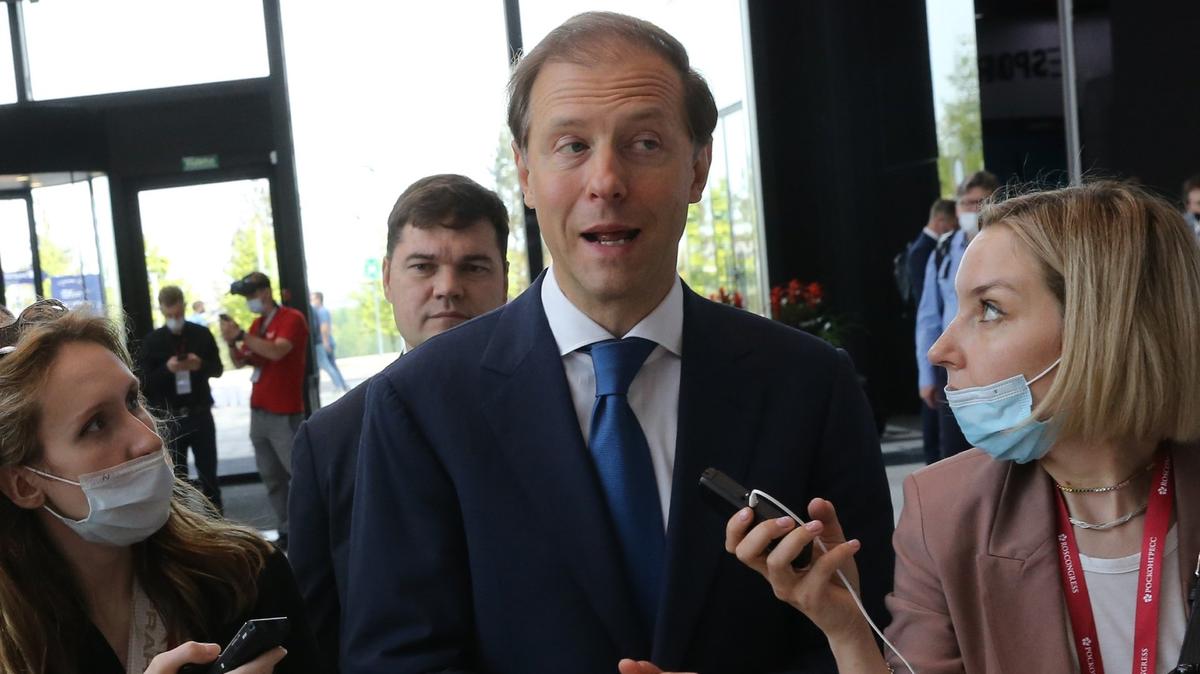On 15 July, the Russian State Duma (lower house) convened an emergency session to approve the appointment of Russian Minister of Industry and Trade Denis Manturov as Deputy Prime Minister. He also retained his previous position. President Vladimir Putin had signed a corresponding order several days earlier. Manturov has worked in the government since 2012, when he was put in charge of import substitution. Now, he is tasked with leading Russia to “technological sovereignty”. A correspondent with Novaya Gazeta. Europe tells the story of the richest Russian minister (with the annual income of over €11.5 mln), whose appointment required an emergency Duma session.
Although no one doubted Manturov’s appointment (Prime Minister Mikhail Mishustin immediately proposed his candidacy), the Russian State Duma deliberated his appointment for over two hours. Chairman of the Russian State Duma Committee for Industry and Trade Vladimir Gustenev was the first to speak in support of Manturov’s appointment. He praised the Ministry of Industry and Trade for its innovative and effective approaches and highlighted its importance in the times of “sanctions pressure”.
Manturov was the next to speak. The official talked about the state of Russian industrial sectors in times of a crisis and about what has to be done to save the Russian economy (Russia needs to move from its “completely market-based industrial policy to the policy of ensuring technological sovereignty”). Then, he took some time to answer the lawmakers’ questions. After the Q&A session was over, the Duma factions expressed their support for Manturov’s candidacy.
“I’ve heard this well-known phrase many times over the years: Russia has only two allies, its army and fleet,” head of the New People faction, businessman Alexey Nechaev, said. “I think we’ve got a third ally, our industry. The industry helped us repel the economic Blitzkrieg, the Western attempt at a Blitzkrieg. <…> So of course, we support him [Denis Manturov].”
A total of 394 lawmakers voted in favour of Manturov’s appointment as Deputy PM, and one lawmaker abstained. No Duma member voted against his appointment.
The prince of Rostec
Head of the Ministry of Industry and Trade Denis Manturov is 53 years old. He was born in Murmansk, in the family of Valentin Manturov, who served as first secretary of the Murmansk Komsomol (a youth organisation in the Soviet Union — translator’s note). The future minister spent part of his childhood outside the Soviet Union: in the late 70s, his parents moved to India where his father worked as the head of the Soviet cultural centre. After that, Valentin Manturov worked as the first secretary of the USSR mission to the UN in New York and later as an advisor with the USSR embassy in Sri Lanka.
In 1994, Manturov graduated from the Faculty of Sociology at the Moscow State University, however, he did not start his career in this field. Instead, the future minister got involved in the aviation business: in the 90s, he worked at a Russian-Indian company AeroRepcon that organised private flights and exported Russian helicopters to India and China. He also served as deputy head of the Ulan-Ude Aviation Plant. In the early 2000s, he was appointed commercial director of the Mil Moscow Helicopter Plant.
In 2001, Manturov took the job of deputy chairman of the State Investment Corporation (Gosinkor). The organisation with the authorised capital of $1.2 billion was established during the presidency of Boris Yeltsin to attract foreign investment. It was dismantled in 2003. After he left Gosinkor, Manturov was appointed director general of OPK Oboronprom, a Russian aerospace holding company that was involved in consolidating helicopter and engine production assets.
In 2007, Manturov took his first government job. He was first appointed Deputy Minister of Industry and Energy, and then got the job of Deputy Minister of Industry and Trade in 2008. Several years later, he would head the ministry.
Experts interviewed by Novaya Gazeta. Europe describe Manturov as a bureaucratic technocrat and a “prince”.
Head of Transparency International Russia Ilya Shumanov says Manturov is a young and promising government official who managed to earn the confidence of his higher-ups through clientelism, that is, through establishing a line of communication with his older colleagues. According to Shumanov, Manturov’s mentor and patron is Sergey Chemezov, the CEO of Rostec, a state-owned defence conglomerate. Chemezov is an old buddy of Putin, who met the Russian president back during the Soviet era in Dresden. Political analyst Abbas Galyamov also ties Manturov to Putin’s Chief of Staff Anton Vaino.
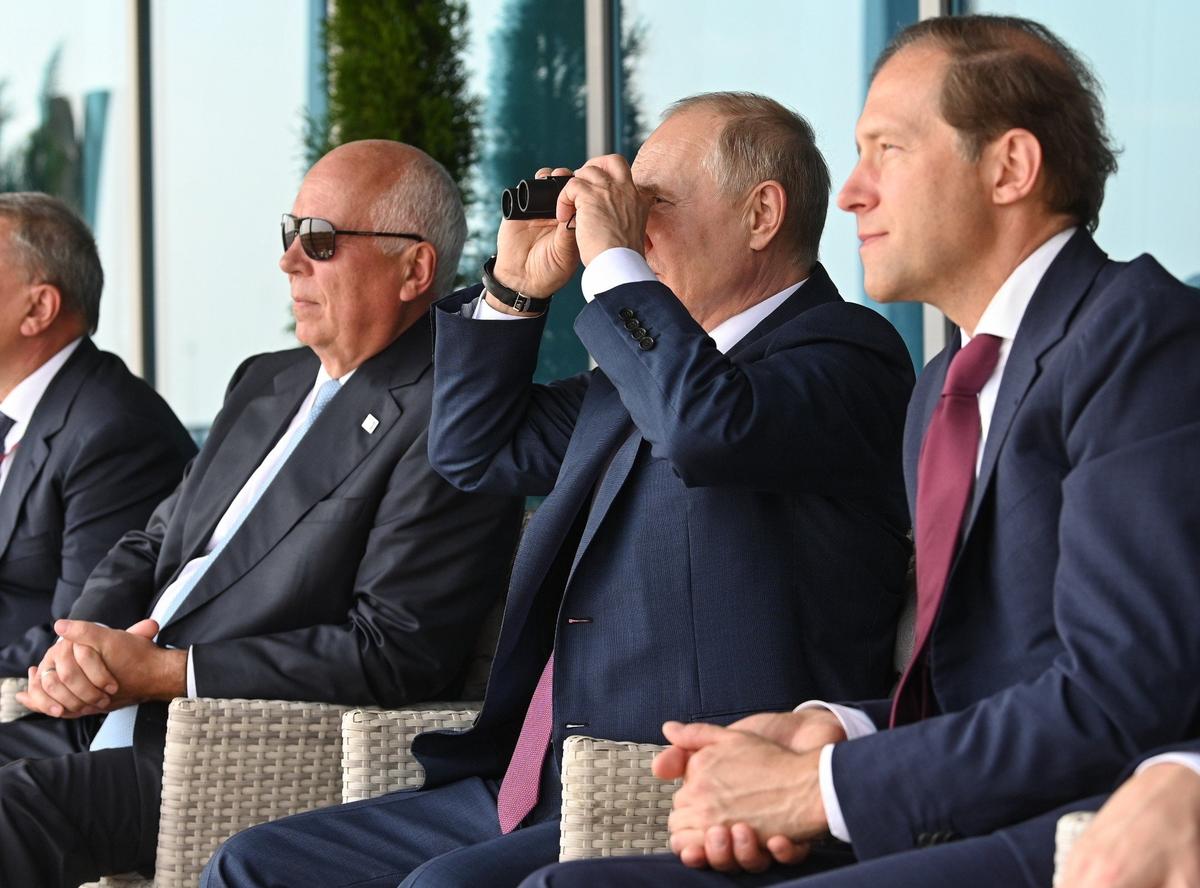
Sergey Chemezov, Vladimir Putin and Denis Manturov. Photo: EPA-EFE
“Before the Ministry of Industry and Trade, Manturov’s career was connected to the defence industry. He worked at two military-oriented plants and at Oboronprom. All this is considered Chemezov’s informal, and in some cases official, area of responsibility. Over the past few years at the Ministry of Industry and Trade, he has not shied away from these ties. [At the ministry] he worked to strengthen Rostec assets and actively lobbied the company’s interests both when it came to project funding and the transfer of authority, as well as to the handover of assets that fell into Rostec’s perimeter,” Shumanov says.
Meduza wrote about Chemezov being Manturov’s patron back in 2016. The outlet claimed that the businessman needed “helpers” in the government to turn Rosoboronexport, the only exporter of Russian weapons, into a state corporation. At the time, it was the parent company of Manturov-led Oboronprom. Later, Rostec would be founded on the basis of Rosoboronexport. Chemezov called Manturov “a reliable friend”. Besides, the minister has served as Chairman of Rostec Supervisory Board for the past ten years.
The Ministry of Industry and Trade made several decisions in favour of Rostec during the COVID pandemic, namely regarding artificial lung ventilation equipment. According to Proekt’s investigation, the ministry selected the companies owned by Rostec (Concern Radio-Electronic Technologies, or CRET, and AO Shvabe) as the “unified suppliers” of artificial lung ventilation machines, undertaking to purchase ventilators, thermometers and thermal imaging cameras to the tune of 12.5 bln rubles (€210.7 mln). Separate Russian regions also purchased lung ventilation machines from CRET for just 7.2 bln rubles (€121.3 mln).
Russian regions also purchased lung ventilation machines from the Ural Instrument-Making Plant, which also forms part of the corporation (even before COVID-19, the plant went to court demanding to cancel the purchase of foreign lung ventilation machines in favour of their Russian analogues, IStories reported).
The equipment produced by the Ural Instrument-Making Plant caused fires at COVID hospitals in Moscow and St. Petersburg, killing seven people.
Besides, in March 2021, Nacimbio, a holding owned by Rostec, was designated as the sole supplier of COVID vaccines in Russia. Nacimbio used to be the sole supplier of vaccines within the National Immunisation Calendar, which received funding from the federal budget. However, the situation with COVID vaccines was slightly different. At first, Immunotekhnologii, owned by Sber, was named the sole supplier. According to Vedomosti sources, Nacimbio could have been appointed the sole supplier from the start due to its years of experience, however, due to high risks, the company likely refused to take on this role at the very start of the pandemic.
Other experts that Novaya Gazeta. Europe has talked to also point to Manturov’s ties to Rostec. However, they note that Manturov should be considered a more independent and autonomous figure in Russian politics. Political expert Ivan Preobrazhensky says that over the past ten years, Manturov has become a politician with a great deal of influence.
“At first everyone thought of him as a young boy who only got the job with the help of, let’s say, Sergey Chemezov, who wanted him to promote his interests within the government and work on strengthening Rostec. However, over the years, he has become an influential figure, allied with Chemezov and Rostec, of course, but an independent one,” Preobrazhensky explains. “Back in 2018, there were rumours that he might be appointed Deputy PM. Some even suggested that he might take on the role of acting PM when Medvedev was fired [in 2020]. But the situation resolved itself rather quickly back then.”
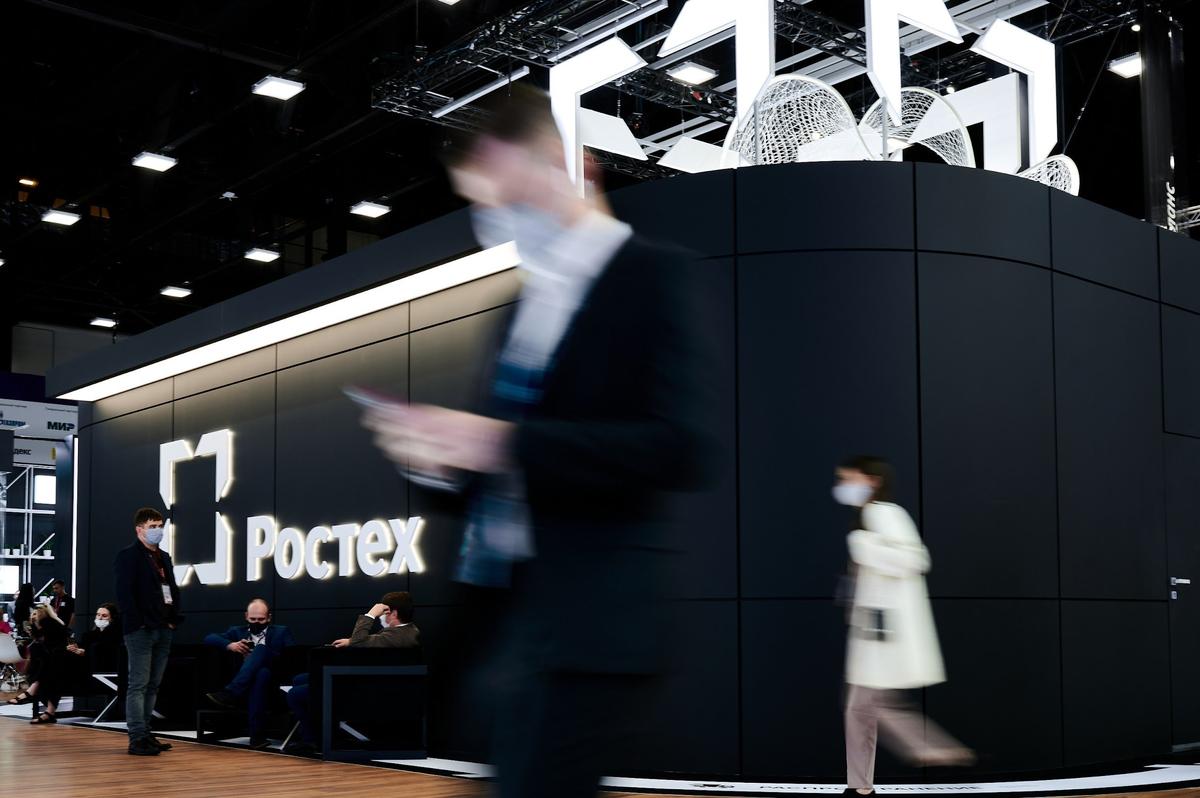
Photo: Rostec
Import substitution
According to Kirill Petrov, head of analytics at Minchenko Consulting, Russia has two key ministries that determine the course of the country’s domestic economy: the Ministry of Finance and the Ministry of Industry and Trade. A lot of money goes through these ministries, where the interests of businessmen and government officials overlap. Shumanov explains that the Ministry of Trade deals with everything, “from jeans to space”, that is, it essentially oversees numerous sectors of the Russian economy: pharmaceutics, light manufacturing, the military-industrial complex, space, public catering, domestic and foreign trade and many others.
Manturov took the job of Minister of Industry and Trade in February 2012, back when Dmitry Medvedev was president and Putin served as PM. However, he was officially appointed to the post only in May, after the presidential election, when Medvedev took on the role of prime minister. Preobrazhensky says that Manturov was appointed to lead import substitution, although there were still two years left before the annexation of Crimea and the start of anti-Russian sanctions.
Russia started talking about import substitution in the 2000s. In 2006, Kate, a company owned by Chemezov’s wife Ekaterina, planned to develop Russian automatic gearboxes for passenger cars together with AvtoVaz (IStories recently published an investigation into why that did not happen — editor’s note).
Import substitution took on a larger role during the 2008-2012 “Medvedev modernisation”, however, it was not a priority area of development back then and it was interpreted differently than it is right now.
Economist Oleg Vyugin recalls an op-ed by Vladimir Putin published by Vedomosti in 2012, shortly before the election, dubbed “We need a new economy”. Putin’s spokesman Dmitry Peskov said at the time that the issues outlined in the article must lay the basis of his presidential program. The presidential candidate said in his op-ed that despite Medvedev’s efforts, the Russian investment climate does not cover the country’s needs. Part of the article was dedicated to Russia’s place in the “global division of labour”: in it, Putin criticised the country’s dependence on import. However, he insisted that Russia’s economy could not be changed only with protectionism measures.
“Naturally, no one wants to repeat the experience of the Soviet Union that formed a completely autonomous technological base during a confrontation with the West. As a result, the majority of ‘original’ technological achievements lagged behind their competitors, which was only uncovered when the iron curtain fell,” Vladimir Putin wrote in 2012.
According to Oleg Vyugin, back then, the import substitution approach was rather reasonable: politicians said that Russia needed to cooperate with international companies and to build supply chains in such a way that would encourage Russian companies to develop their own technologies while borrowing the existing ones. However, after 2014, the official policy changed completely.
“After the sanctions, there was a shift towards isolationism. Since then, import substitution has been based on this idea: ‘They hit us with sanctions, so we need to learn to live without foreign technology.’ That is, Russia needs to reinvent what is already there on its own,” Vyugin says.
Following the annexation of Crimea, import substitution has become one of the key areas of the Russian economy, or at least the most publicised. In 2015, Dmitry Medvedev established an import substitution commission (although the last time it convened was in 2019). Manturov was one of the members of the commission.
Despite the fact that Manturov was not the only import substitution player, Preobrazhensky says that he managed to unite many production processes around one ministry. Until his appointment, the ministry mainly dealt with military production and old Soviet plants. Since the 2010s, it has taken on a much more significant role.
“Until Manturov, the Ministry of Industry and Trade was called ‘a lobbying point’ of ex-Soviet elites (the ministry was founded in 2008. Up until that time, Russia had the Ministry of Industry and Energy, and from 2000 to 2004, the Ministry of Industry, Science and Technology — editor’s note). Under Manturov, it has become a future-oriented agency focusing on the substitution of foreign industry or transferring foreign enterprises and technologies to Russia. The agency was essentially in charge of creating new Russian industrial sectors and recovering the sectors that were lost after the fall of the Soviet Union,” Preobrazhensky explains.
Some things can’t be replaced
Experts offer very different assessments of import substitution, and although no one doubts that this policy was not implemented to the full extent, the degree to which it was implemented is a point of discussion. On the one hand, economists note that before the programme was launched, Russia significantly depended on import, and domestic production was at a very low level. On the other hand, Shumanov points to the “failures” of the program: lung ventilation machines going up in flames and corruption scandals within the ministry. For example, Pharma-2020, the ministry’s program aimed to adopt Western medical technologies in Russia, which attracted billions in investments, did not achieve any of its goals, leading instead to embezzlement charges and numerous arrests.
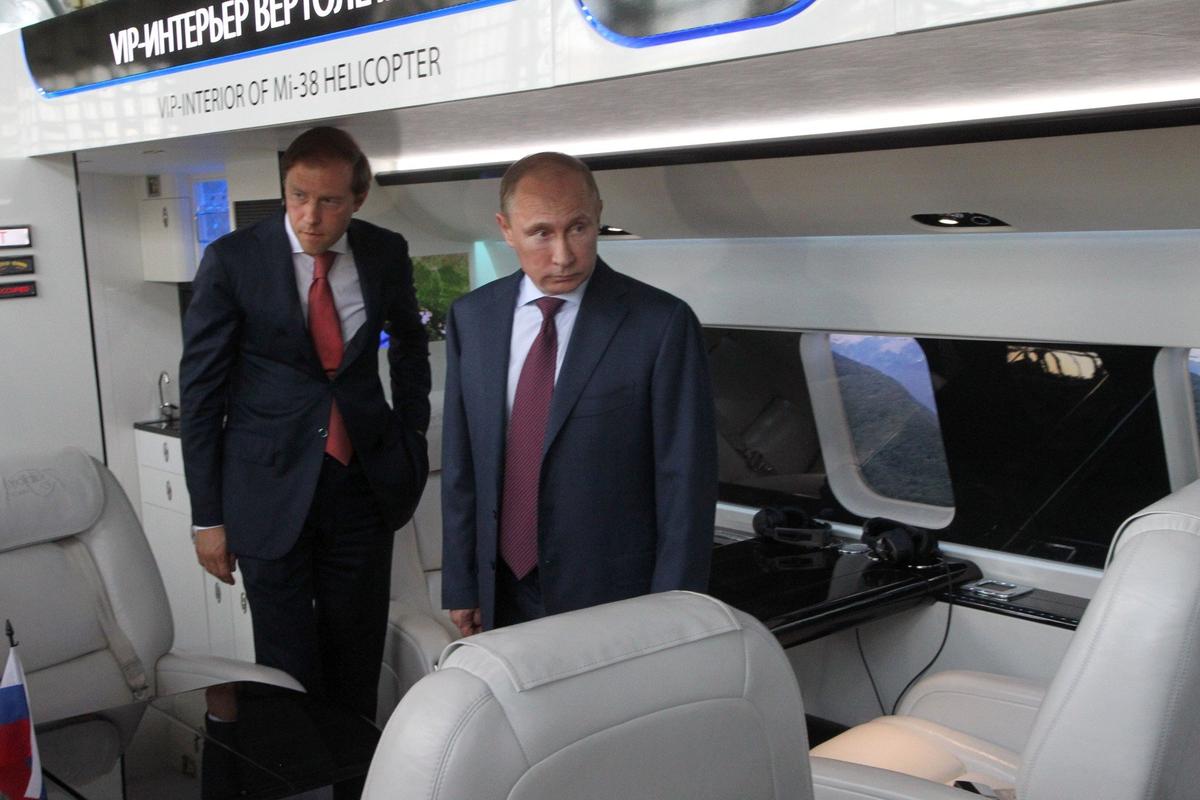
Denis Manturov and Vladimir Putin inspect the cabin of a new Mi-38 helicopter during a visit to a helicopter plant. Photo: Sasha Mordovets / Getty Images
According to economist Vladislav Inozemtsev, the launch of the import substitution programme was littered with “mishaps” when products made in China or Turkey were passed off as Russian. At the same time, the number of imported parts in other sectors of the economy was steadily going down. The problem was that no one provided any exact guidelines on what they were supposed to achieve.
“The point of import substitution used to be increasing the added value,” Inozemtsev explains. For example, there is a cognac factory in Kaliningrad. In the Soviet era, it produced second-rate alcohol. Then it was bought by successful entrepreneurs who started producing good cognac based on cognac spirit from France. The product is technically foreign, but the added value in Russia surpasses 40%, so it could be declared as Russian.”
Until recently, all industrial sectors in Russia used the same approach, Inozemtsev notes. For example, in recent years, Russia has managed to bring down its sugar import to zero, although it used to reach about 60% in the early 2000s. It seems that import substitution was successful here. But the problem is that 90% of sugar beet seeds were imported from Europe. Inozemtsev points out that it is practically impossible to replicate these seeds.
Localisation (the share of production processes taking place on Russian territory and the use of local parts and materials) in the automotive industry was gradually rising, too. Localisation was estimated on a scale with the maximum value of 8,800 points. Many popular car models in Russia did not surpass 5,000 points, and more often than not, their score was much lower: Lada Granta scored 4,621 points, followed by Renault Logan (2,199), Kia Rio and Hyundai Solaris (1,550).
“From a business standpoint, it was the right thing to do, their goal was to increase the added value. But now it turns out that even if we created our own automatic gearbox and waived the airbags, microchips, brake and wheel synchronisation systems, we still wouldn’t have ended up with a modern car,” Inozemtsev says.
“Although earlier we said that localisation at, say, 80% in Russia would be a great advantage, we understand now that without the other 20%, cars still wouldn’t start. We needed at least 10 more years to achieve 100% import substitution, and even then, only if our attention was focused solely on this goal.”
After the start of the full-scale invasion of Ukraine, the subsequent sanctions, the mass pull-out of companies from Russia and the shutdown of foreign markets, the gaps in Russian production became much more obvious. The price of white office paper skyrocketed, and many shops started selling yellow-tinted paper instead. This was due to Kemira, a Helsinki-based chemicals company that used to supply sodium chlorate required to whiten sheets of office paper, leaving the Russian market. The production of passenger cars essentially grinded to a halt (dropping by 96.7%). The production of Russia’s own passenger plane MS-21 was postponed from 2022 until 2024.
Meanwhile, Russia allocated about 3.5 trillion rubles (about €58.4 bln) from the federal budget for the purposes of import substitution. This is the figure provided by former Deputy PM Yury Borisov in late May at a conference dubbed “Industrial policy in a new reality”. Besides, Russia has spent 160 bln rubles (€2,6 bln) since 2014 to avoid depending on foreign parts in military production.
“We need to understand that there are enormous amounts of money behind Manturov, allocated for the so-called import substitution. It either went through Yury Borisov (who until recently served as Deputy PM overseeing the military-industrial complex — editor’s note) for the needs of the military industry, or it went through Manturov. It also went through the Ministry of Communications for IT projects of different kinds. But still, Manturov got the lion’s share of it at the Ministry of Industry and Trade,” Preobrazhensky says.
The wealthiest minister
As Russia’s import substitution muddled along, Manturov’s earnings grew extensively. He has been Russia’s richest cabinet minister in the past several years: he declared an annual income of 586 million rubles (€9.7m) in 2019, as well as 740 (€12m) and 704 million (€11,5m) in 2020 and 2021, respectively. His wife Natalya Manturova added over 50 million (€837k) to the family budget: she works part-time for the Health Ministry’s plastic surgery department and owns several medical aesthetics clinics. Manturov’s 2021 declaration also included multiple land lots, a 33,000 square feet mansion, a 5000 square feet guest house and two cars, a Russian Lada Vesta and a Tesla X100D.
“It’s a good question where he gets this money from,” Shumanov says. “Each time he is asked this question, he says it’s all about his ROI and bank deposit interest” (Manturov actually said that in his interview for RBC — editor’s note).
“But how much money should be deposited to a bank to bring such interest? What kind of stocks produce a passive income of 740 million rubles?
Frankly speaking, I do not believe a government bureaucrat, albeit a cabinet member, is able make so much money. Manturov has been been employed by the state for over 20 years.”
He says he became rich by working in the real sector back in the day. Members of his family now own real estate and hotels; some of them work in agriculture. Manturov sees no conflict of interests here, as he is in charge of a different sector, he says. The people we spoke with consider him a sybarite who has the skill to use business environment to climb up the career ladder; his family lead a robber baron lifestyle.
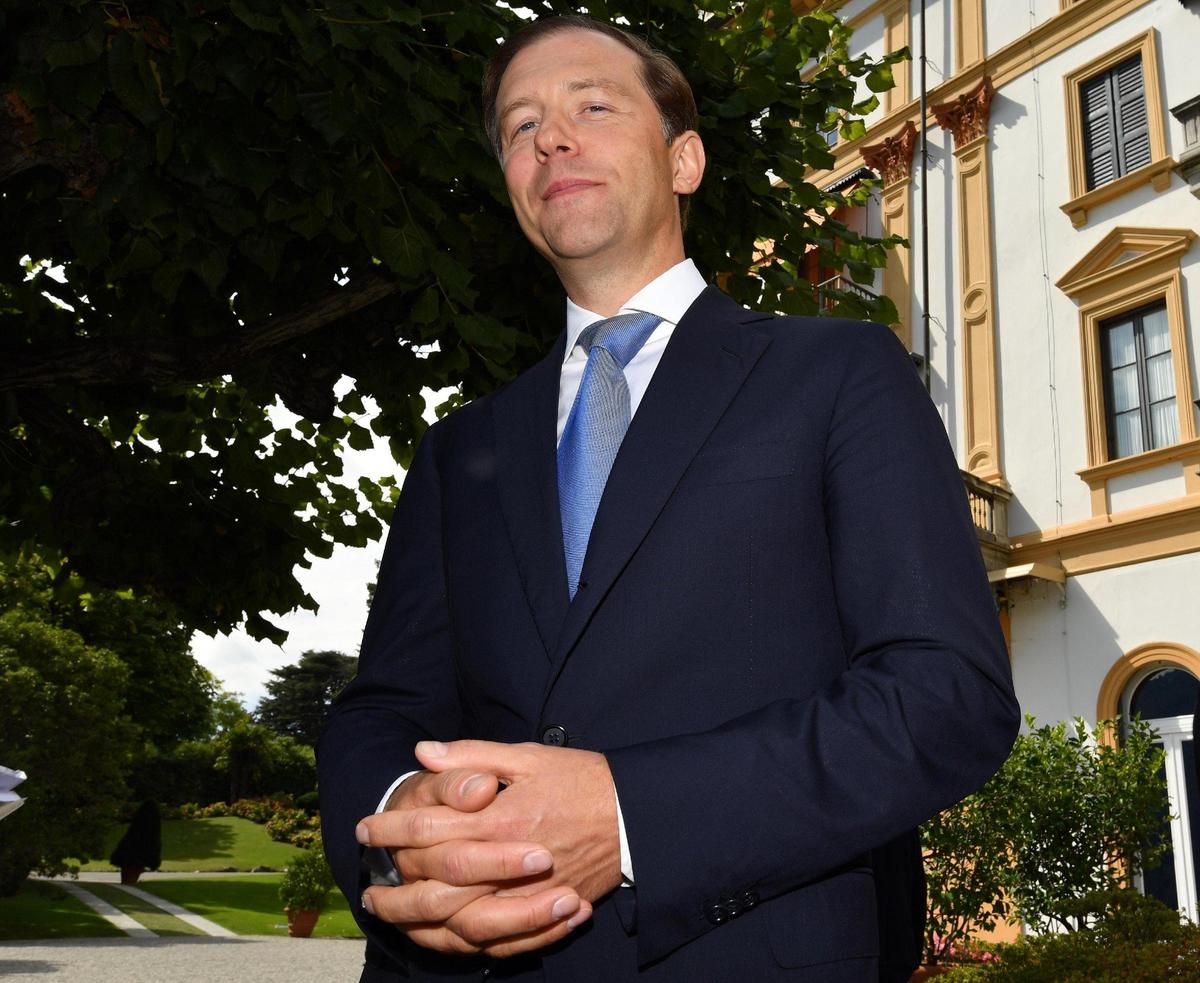
Photo: EPA-EFE
“His true income may only be determined by his properties which are hard to detect now that most of independent media capable of investigating this sort of things are banned in Russia. Anyway, it’s clear that this man is a billionaire and that his true income is way higher than what he declares officially; this is applicable to all members of the government,” Preobrazhensky says. “However, he is THE wealthiest cabinet minister anyway. This reflects how things really are; he is indeed involved into the government’s cash flow more than anyone else.”
Manturov is addicted to luxury, according to Transparency International’s 2019 investigation on Russia: he spends millions on presidential suites on his business travels. Staying at The Peninsula hotel in Shanghai cost him 1.4 million rubles (over €23,000) per night, which included a two-storey dining hall and a marble bathroom. Other places he visited were cheaper yet no less luxurious: a presidential suite at the Four Season in Mexico City, also with a marble bathroom, is 480 thousand rubles (€8000) per night; and a room in Zhengzhou with a lake view cost him 330,000.
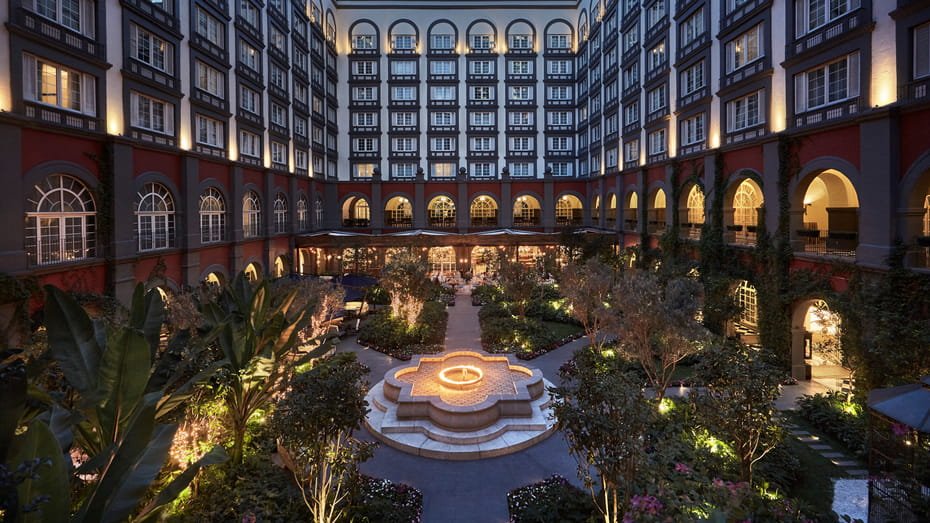
Four Seasons Hotel Mexico City. Photo from the hotel website
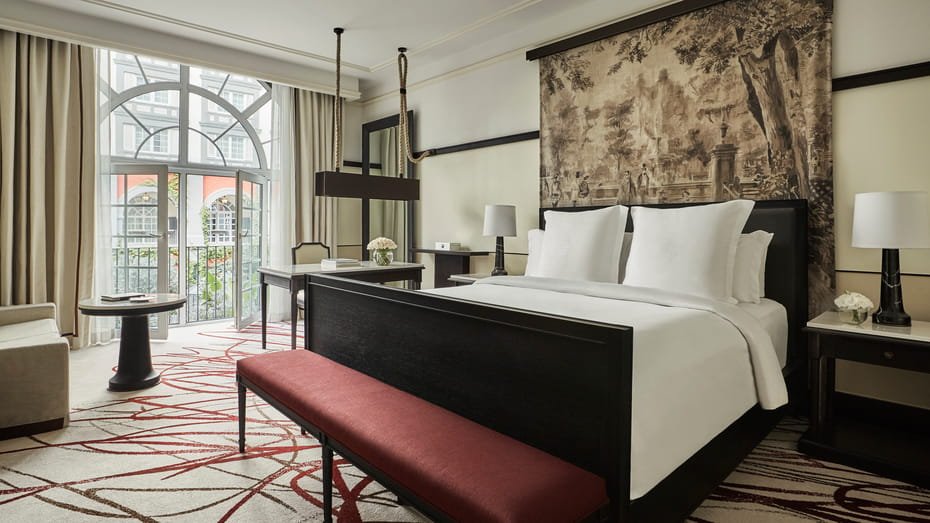
A room at the Four Seasons Hotel Mexico City. Photo from the hotel website
He justified such expenses by simply saying “they are easier to book.” “It's just that I stayed at the rooms that were available in each city,” he said.
A different investigation by Transparency International said Manturov was using private jets, namely a Sukhoi Superjet 100 and a Tu-204 on his business travels and personal trips.
A total of 57 such flights were made in 2019 alone, at a total cost of 200 million rubles (€3.3 million).
9 of the flights were to Gelendzhik; the information on those was not published on Russia’s public procurement website, although it had info on Manturov’s hotel bookings (there is no mention of his flights there whatsoever). Nonetheless, there are pictures of his private jets all over the Internet, and, according to Flightradar, their routes coincide with the destinations of Manturov’s business trips. Manturov himself confirmed using a Sukhoi Superjet 100, too.
It is unknown where the minister gets the money to travel; the expenditures are high even for a person of his wealth. Manturov’s ministry replied to Transparency by saying they “do not hire private jets for the managers” but simply book air tickets as other people do.
Denis Manturov has been Minister of Trade and Industry for over ten years, he was not moved from his position in 2020 when Mikhail Mishustin became PM and sacked most of the previous government.
There is a number of reasons behind Manturov’s “ongevity” in the cabinet. Firstly, Chemezov’s influence on Russia’s industrial policy is quite obvious. Secondly, Mishustin might have been reluctant to demand management reshuffle in one of the most important departments; such appointements are normally made by the people of higher authority.
“Manturov and Chemezov have a good relationship to say the least; Manturov might even be his protégé. Chemezov is obviously interested in Manturov keeping his job,” an anonymous political scientist linked with the government tells us. “A more conformist explanation is that Mishustin doesn’t have many people at his disposal to waste the likes of Manturov, so he decided to do his job instead of getting himself into a dangerous game.”
Denis Manturov got himself a promotion soon after the Ukraine War had started.
‘Lavrentiy Beria after WW2’
Russia’s State Duma confirmed Manturov’s appointment as Deputy Prime Minister on 15 July. Meanwhile, Yury Borisov, another Mishustin’s deputy who was in charge of defence and space industry became Director General of Roscosmos, Russia’s space agency, replacing Dmitry Rogozin.
Manturov said in his address to the parliament that Russia would be “moving from market-oriented industrial policy to a policy of technological sovereignty,” or, simply put, towards import substitution. He also added that setting up co-operation is necessary to supply Russia’s market with critically needed commodites.
“We are actively working towards this alongside enterprises and commercial agencies. What we are also aiming at is to produce our own goods to replace foreign ones,” he said.
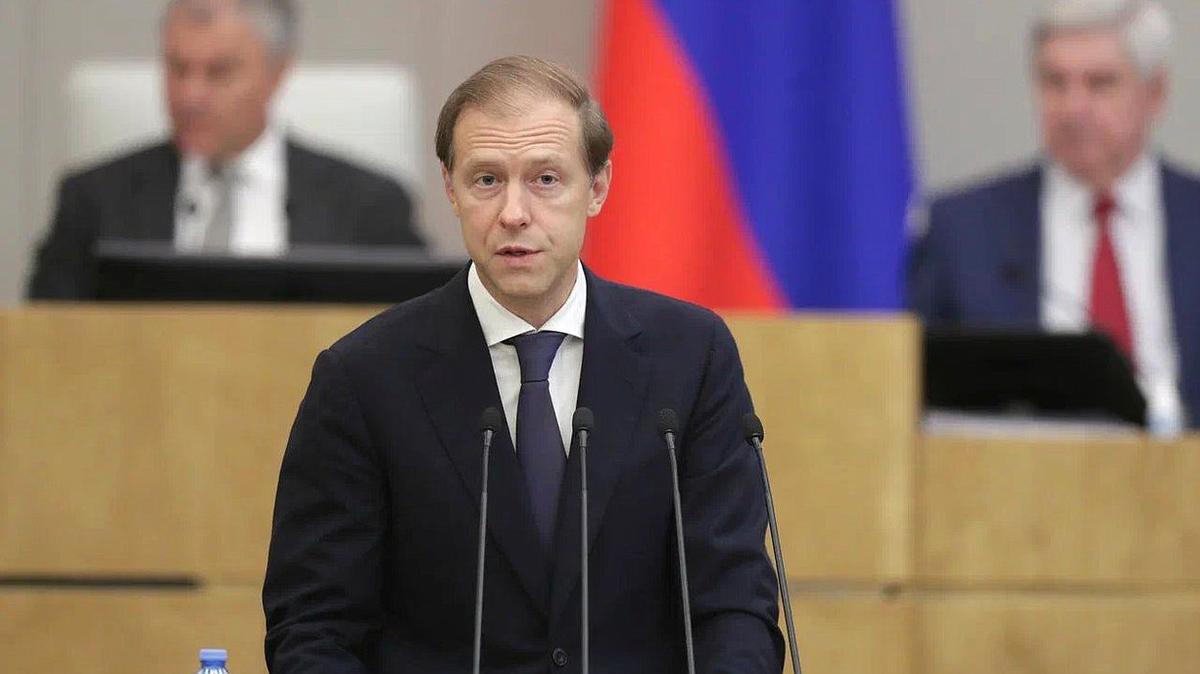
Photo: Russian State Duma
Although Russia faced obvious problems after the Western sanctions had been imposed, naturally due to the poor implementation of the import substitution project, experts agree that Manturov is far from being considered responsible: he wasn’t the only person in charge of replacing foreign technology with domestic solutions. Moreover, Putin even criticised Chemezov and Rostec for “low performance regarding the IT sector.”
During his speech, Manturov said that he would be aiming to scale up the production of high-precision weapons and unmanned aircraft, as well as all sorts of things his predecessor was in charge of. This speech was delivered a few days after the State Duma adopted a new law that would bar Russia’s private companies from rejecting state contracts should they be offered. The requesters, including the FSB, the Defence Ministry, the National Guard, and the Federal Rescue Service, will dictate terms of such forced “co-operation.”
The Government later announced that Manturov would be in charge of the state industrial policy, as well as nuclear energy, the country’s space programme, shipbuilding, aircraft manufacturing, electronics production and even the defence industry.
Our source says no big changes should be expected. This is more of a formal appointment; simply being deputy PM means very little in modern Russia as personal relationships with Vladimir Putin are far more significant. However, Manturov’s responsibilities will slightly change, our experts say.
“He will be managing co-ordination between different people now,” Shumanov believes. “He used to fulfill various assignments given to him from the people above him, including Chemezov. From now on, he himself will be giving assignments to different ministers. So, he will in fact be in charge of multiple ministries. Moreover, he will be responsible for the defence industry. This seems a little weird to me for he is not a military man.”
Some of our experts tend to think Manturov’s appointment was the result of Russia’s failure to achieve its early goals during the first several months of the Ukraine War, although The Bell reported that it was discussed before the invasion, too. Shumanov points out that Manturov has been working with Rostec for a long time, and he has experience in the defence industry, too, so he is probably capable of implementing the “wartime footing” project.
Beyond that, many people who were employed in the defence industry sometime ago are now being persecuted, and Yury Borisov, Manturov’s predecessor, may have fallen out of favour. Preobrazhensky believes that the fact that Russia’s defence industry failed to produce the weapons and equipment it promised to is now considered Borisov’s fault.
“You see, high precision missiles fly just anywhere, and there are no Armata tanks to be fair. Borisov is responsible for this, and not Sergey Shoigu (Russia’s Defence Minister — translator’s note). Borisov is now CEO of Roscosmos as there will obviously be no real space programme now, and Manturov is to use Borisov’s budget,” Preobrazhensky explains.
“So, he has now become Russia’s largest customer in terms of industrial and technological projects. He is now like Lavrentiy Beria after WW2.”
However, other experts are sceptical about the defence industry’s prospects. Russia’s economy is totally geared toward the market-oriented model, Inozemtsev says. It would be really challenging for the current authorities to put a crimp in the plans of large corporations, unless huge money is involved.
Some experts believe Manturov is not the right person to implement the “wartime footing” project as he has never been a man of principle. For instance, he has been dead against inviting companies from China into Russia’s car industry for years. Yet, China’s Haval cars had been manufactured in a factory near Tula until very recently, although Manturov did not change his mind.
Abbas Galyamov, a political scientist, believes that even Manturov’s temper does not match the wartime.
“He is totally a businessman in power, the likes of him prefer opportunism and luxurious lifestyle to mobilising economy or tightening the screws. Manturov is not a wartime minister at all. His appointment is the regime’s demonstration that there will be no ‘military communism’. The things are going to remain as they are. The officials will keep their grand patriotic rhetoric, and money will still be stolen from the state budget.”
Делайте «Новую» вместе с нами!
В России введена военная цензура. Независимая журналистика под запретом. В этих условиях делать расследования из России и о России становится не просто сложнее, но и опаснее. Но мы продолжаем работу, потому что знаем, что наши читатели остаются свободными людьми. «Новая газета Европа» отчитывается только перед вами и зависит только от вас. Помогите нам оставаться антидотом от диктатуры — поддержите нас деньгами.
By clicking the Support button, you agree to the processing of your personal data.
To cancel a regular donation, please write to [email protected]
